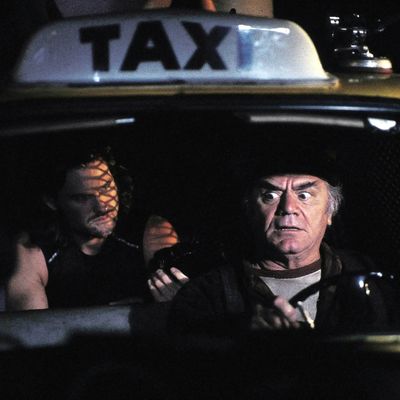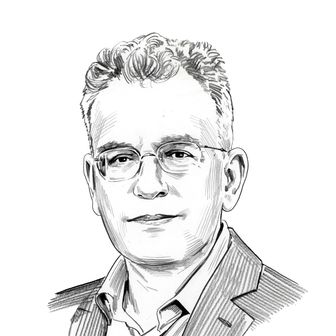
Ted Cruz, in lacerating mode at the debate last night, made a move to wound Donald Trump with the three nastiest words he could come up with. “Everybody understands that the values in New York City are socially liberal and pro-abortion and pro–gay marriage,” he said. “And focus on money and the media.” Trump’s answer added up to “nuh-uh,” as it usually does. Governor Cuomo hit back this morning, too.
New York City. There’s a long tradition of treating us as Babylon-on-the-Hudson, of course, and of our uneasily attempting to laugh it off. Think of the foul place pictured in Midnight Cowboy or Panic in Needle Park or Taxi Driver or Fort Apache, the Bronx: All use the rotten city not just as a backdrop but practically as a character, and not one in charming dishabille but really one that’s sick and rotten. I think especially of The Taking of Pelham One, Two, Three, in which the subway dispatcher Kaz Dolowicz is not merely a smartass and a cynic but an actually unpleasant presence. (Spoiler: He gets shot, in part for mouthing off.) Woody Allen — certainly an archetype of questionable New York values — summed it up neatly in Annie Hall: “Don’t you see the rest of the country looks upon New York like we’re left-wing, communist, Jewish, homosexual pornographers? I think of us that way sometimes, and I live here.”
Except that most of the country doesn’t see us that way, not quite, not anymore. In my own 20-odd years here, the public perception of New York and New Yorkers has seen a tidal shift. The public perception of us is not Travis Bickle but Ross Geller: a few neuroses, maybe a little un-Christian when it comes to sex, but fundamentally a big, ordinary small town. City life is no longer perceived as quite so alien, and somehow this biggest, toughest city is seen as one of the friendlier ones in America. The rotting-city-on-a-hill archetype, these days, feels weirdly dated. When a right-wing politician wants to invoke a big town full of gunplay, he can’t drop “New York” anymore; usually he offers Chicago, or maybe Detroit. The nastiest New York character a lot of people can come up with is George Costanza, and he’s hardly monstrous. He’s just a pain in the ass.
It’s also arguable that the perception of New Yorkers as nicer folks comes from the ending of openly displayed, socially acceptable anti-Semitism. The view of New Yorkers as fast-dealing business sharks is not without racist roots — as the columnist Cynthia Heimel once noted, “the cultural elite” was a lightly coded way of saying “Jews.” As the right has gradually recast itself as Israel’s best friend, it has had to cast out the Bircher anti-Semites within its ranks. You’ll notice that, whereas a generation ago, conservatives routinely spoke of “our traditional Christian values,” that phrase today has always become “our Judeo-Christian values.” That’s no accident.
Last night, Donald Trump hit back at Cruz by invoking 9/11, and in doing so, he neatly identified the moment when middle Americans accepted that New Yorkers were, in fact, American citizens. They’d been softened up by years of Friends and Seinfeld and Carrie Bradshaw, but that was the demarcation line. Nothing brings sympathy like a wounded soldier, and suddenly New York was on its knees. Blue-collar guys, breathing ash and poison, started to put it back together, and even one of the most disagreeable public figures we have ever spawned — one who was so abrasive that he had been widely considered a failure by September 10 — became its hero, and everyone briefly thought he might have a chance at the White House.
Caricatures of cities take a generation to break down. People who wish to evoke London still use bowler hats and red cast-iron phone booths, both of which are all but extinct. The French haven’t surrendered to anyone else in years, no matter how the jokes go. (It goes both ways, too. Judging by a French magazine I saw on my last visit, Parisians still seem to think Manhattan is full of people who listen to le jazz hot in little clubs and go to see art-house movies at the Elgin.) Outdated readings of the world tend to linger longest, of course, among the elderly, whose minds can grow settled and stubborn. And, of course, that’s the Republican base — and Ted Cruz himself, a prematurely old man whose worldview, his college classmates say, has changed not one speck since 1989. Cruz, by picking on New York, was working a perception that falls to hand easily for his voters, even if that perception, and those voters, are slowly dying of old age. He may not have thought this through, however: After all, the loudest, brashest, New Yorkiest New Yorker on that stage is the one who’s winning.






























